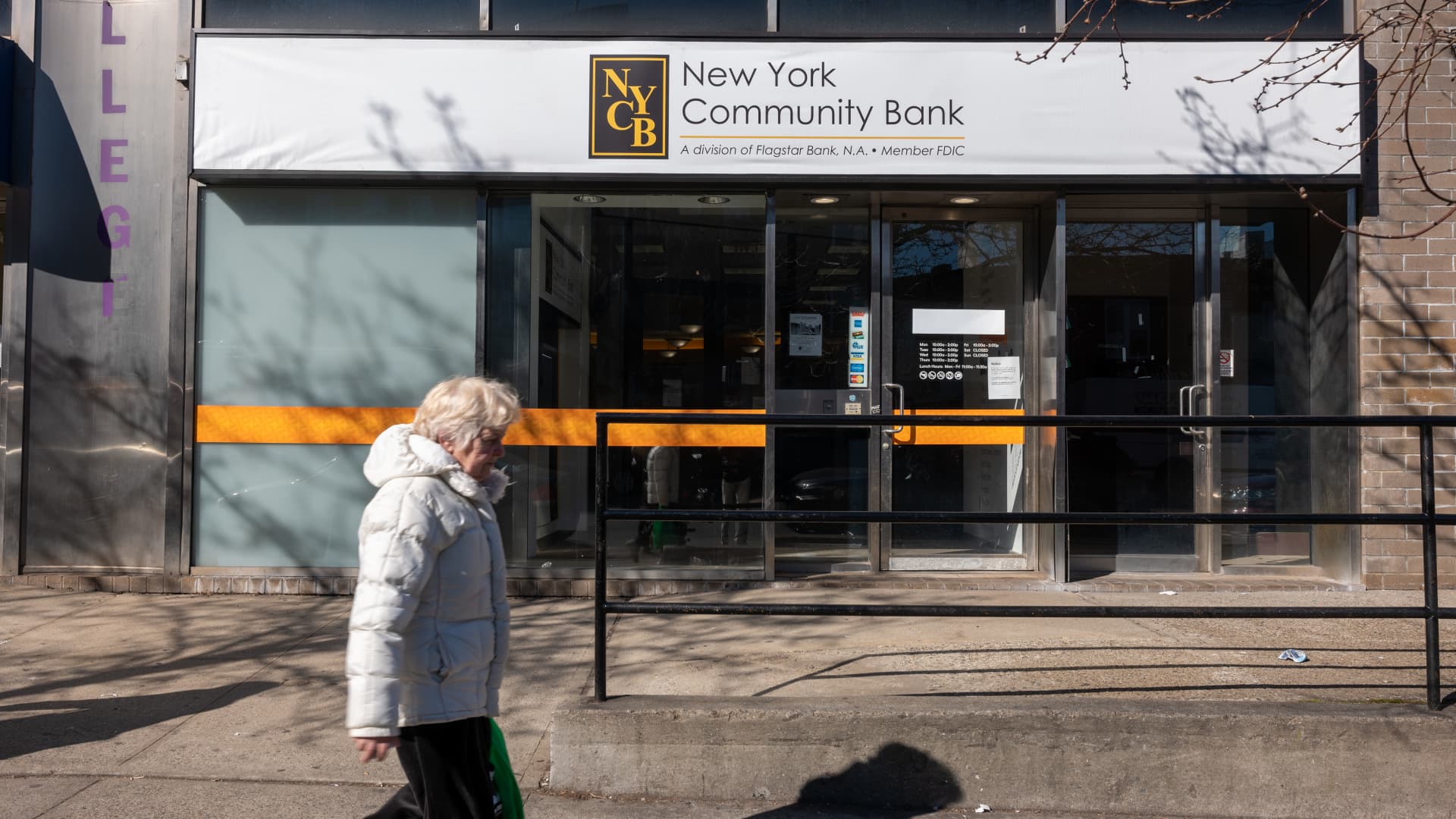New York Community Bank said Thursday it lost 7% of its deposits in the turbulent month before announcing a $1 billion-plus capital injection from investors led by former Treasury Secretary Steven Mnuchin’s Liberty Strategic Capital.
The bank had $77.2 billion in deposits as of March 5, NYCB said in an investor presentation tied to the capital raise. That was down from $83 billion it had as of Feb. 5, the day before Moody’s Investors Service cut the bank’s credit ratings to junk.
NYCB also said it’s slashing its quarterly dividend for the second time this year, to 1 cent per share from 5 cents, an 80% drop. The bank paid a 17-cent dividend until reporting a surprise fourth-quarter loss that kicked off a negative news cycle for the Long Island-based lender.
Before announcing a crucial lifeline Wednesday from a group of private equity investors led by Mnuchin’s Liberty Strategic Capital, NYCB’s stock was in a tailspin over concerns about the bank’s loan book and deposit base. In a little more than a month, the bank changed its CEO twice, saw two rounds of rating agency downgrades and announced deepening losses.
At its nadir, NYCB’s stock sank below $2 per share Wednesday, down more than 40%, before ultimately rebounding and ending the day higher. The shares climbed 10% in Thursday morning trading.
The capital injection announced Wednesday has raised hopes that the bank now has enough time to resolve lingering questions about its exposure to New York-area multifamily apartment loans, as well as the “material weaknesses” around loan review that the bank disclosed last week.
‘Very attractive’ bank
Mnuchin told CNBC in an interview Thursday that he started looking at NYCB “a long time ago.”
“The issue was really around perceived risks in the loans, and with putting billion dollars of capital into the balance sheet, it really strengthens the franchise and whatever issues there are in the loans we’ll be able to work through,” Mnuchin told CNBC’s “Squawk on the Street.”
“I think there’s a great opportunity to turn this into a very attractive regional commercial bank,” he added.
Mnuchin said that he did “extensive diligence” on NYCB’s loan portfolio and that the “biggest problem” he found was its New York office loans, though he expected the bank to build reserves over time.
“I don’t see the New York office working out or getting better in the future,” Mnuchin said.
Shrinking lender?
Incoming CEO Joseph Otting, a former comptroller of the currency, told analysts Thursday that the bank would look to strengthen its capital and liquidity levels and reduce its concentration in commercial real estate loans.
NYCB will likely have to sell assets as well as build reserves and take write-downs, according to Piper Sander analysts led by Mark Fitzgibbon.
The bank, which has $116 billion in assets, is evaluating whether it should reduce assets to below the key $100 billion threshold that brings added regulatory scrutiny on capital and risk management, executives said Thursday.
When asked by an analyst about the feared exit of deposits after ratings agency downgrades, NYCB Chairman Alessandro DiNello said the bank got “waivers” that allowed it to keep custodial accounts that otherwise may have fled.
“Now I think given this capital raise, we’re hopeful that that relationship continues to be the way it is,” DiNello said.
While news of the Mnuchin investment is good for regional banks overall, Wells Fargo analyst Mike Mayo cautioned that the cycle for commercial real estate losses was just beginning as loans come due this year and next, which will probably cause more problems for lenders.
— CNBC’s Laya Neelakandan and Ritika Shah contributed to this report.
Correction: New York Community Bank announced an investment from a group of private equity investors on Wednesday. An earlier version of this story misstated the day.
This story originally appeared on CNBC

